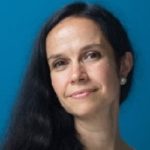
Muriel Médard
Muriel Médard – Keynote Speaker
Title: It’s all in the noise – universal noise-centric decoding.
Abstract: Claude Shannon’s 1948 “A Mathematical Theory of Communication” provided the basis for the digital communication revolution. As part of that ground-breaking work, he identified the greatest rate (capacity) at which data can be communicated over a noisy channel. His proposed algorithm used on random codes and a code centric maximum Maximum Likelihood (ML) decoding, where channel outputs are compared to all possible input codewords to select the most likely candidate based on the observed channel output. Despite its mathematical elegance, his code centric decoding algorithm is impractical from a complexity perspective and much work in the intervening 70 years has focused on co-designing codes and decoders that enable reliable communication at high rates.
In collaboration with Ken Duffy and his group, we introduce a new algorithm, Guessing Random Additive Noise Deceasing (GRAND) for a noise-centric, rather than code-centric, ML decoding. The receiver rank orders noise effect sequences from most likely to least likely, and guesses accordingly. When inverting, in decreasing order of likelihood, noise effect sequences from the received signal, the first instance that results in an element of the code-book is the ML decoding. Our results show that, with GRAND, even extremely simple codes, such as CRCs, match or outperform state of the art code/decoder pairs, indicating that the choice of decoder is likely to be more important than that of code.
We illustrate the practical usefulness of our approach and discuss its hardware implementation, done with Rabia Yazicigil and her group. The complexity of the decoding is, for the sorts of channels generally used in commercial applications, quite low, unlike code-centric ML and the chip is able to decode any linear code.
Bio: Muriel Médard is the Cecil H. and Ida Green Professor in the Electrical Engineering and Computer Science (EECS) Department at MIT, where she leads the Network Coding and Reliable Communications Group in the Research Laboratory for Electronics at MIT. She obtained three Bachelors degrees (EECS 1989, Mathematics 1989 and Humanities 1991), as well as her M.S. (1991) and Sc.D (1995), all from MIT. She is a Member of the US National Academy of Engineering (elected 2020), a Fellow of the US National Academy of Inventors (elected 2018), and a Fellow of the Institute of Electrical and Electronics Engineers (elected 2008). Muriel was elected president of the IEEE Information Theory Society in 2012, and served on its board of governors for eleven years. She holds an Honorary Doctorate from the Technical University of Munich (2020).
She was co-winner of the MIT 2004 Harold E. Egerton Faculty Achievement Award and was named a Gilbreth Lecturer by the US National Academy of Engineering in 2007. She received the 2017 IEEE Communications Society Edwin Howard Armstrong Achievement Award and the 2016 IEEE Vehicular Technology James Evans Avant Garde Award. She received the 2019 Best Paper award for IEEE Transactions on Network Science and Engineering, the 2018 ACM SIGCOMM Test of Time Paper Award, the 2009 IEEE Communication Society and Information Theory Society Joint Paper Award, the 2009 William R. Bennett Prize in the Field of Communications Networking, the 2002 IEEE Leon K. Kirchmayer Prize Paper Award, as well as eight conference paper awards. Most of her prize papers are co-authored with students from her group.
She has served as technical program committee co-chair of ISIT (twice), CoNext, WiOpt, WCNC and of many workshops. She has chaired the IEEE Medals committee, and served as member and chair of many committees, including as inaugural chair of the Millie Dresselhaus Medal. She was Editor in Chief of the IEEE Journal on Selected Areas in Communications and has served as editor or guest editor of many IEEE publications, including the IEEE Transactions on Information Theory, the IEEE Journal of Lightwave Technology, and the IEEE Transactions on Information Forensics and Security. She was a member of the inaugural steering committees for the IEEE Transactions on Network Science and for the IEEE Journal on Selected Areas in Information Theory.
Muriel received the inaugural 2013 MIT EECS Graduate Student Association Mentor Award, voted by the students. She set up the Women in the Information Theory Society (WithITS) and Information Theory Society Mentoring Program, for which she was recognized with the 2017 Aaron Wyner Distinguished Service Award. She served as undergraduate Faculty in Residence for seven years in two MIT dormitories (2002-2007). She was elected by the faculty and served as member and later chair of the MIT Faculty Committee on Student Life and as inaugural chair of the MIT Faculty Committee on Campus Planning. She was chair of the Institute Committee on Student Life. She was recognized as a Siemens Outstanding Mentor (2004) for her work with High School students. She serves on the Board of Trustees since 2015 of the International School of Boston, for which she is treasurer.
She has over fifty US and international patents awarded, the vast majority of which have been licensed or acquired. For technology transfer, she has co-founded three companies, CodeOn, for which she consults, Chocolate Cloud, on whose board she serves, and Steinwurf, for which she is Chief Scientist.
Muriel has supervised over 40 master students, over 20 doctoral students and over 25 postdoctoral fellows.
